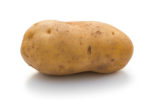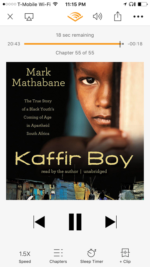By: Stu Cocanougher on September 6, 2017
 I was first introduced to Jim Collins and his book Good to Great years ago at the Willow Creek Global Leadership Summit. Our church, Southcliff, hosted the WCGLS several years via live webcast. Collins’s talk was memorable. The concept that “good was the enemy of great” certainly stuck with me. Having said that, it was…
I was first introduced to Jim Collins and his book Good to Great years ago at the Willow Creek Global Leadership Summit. Our church, Southcliff, hosted the WCGLS several years via live webcast. Collins’s talk was memorable. The concept that “good was the enemy of great” certainly stuck with me. Having said that, it was…
By: Jake Dean-Hill on September 6, 2017
How Africa Shaped the Christian Mind by Thomas Oden was completely shocking to me. Every other chapter revealed another truth about Africa’s contribution to Christianity that has been kept hidden from me all these years. Like the author reiterates throughout the book, I have been brainwashed to believe that most everything Christian had European roots.…
By: Mary Walker on September 6, 2017
“To be successful, the first thing to do is to fall in love with your work.” Sister Mary Lauretta “You begin with passion, then you refine passion with a rigorous assessment of what you can best contribute to the communities you touch. Then you create a way to tie your resource engine directly…
By: Jim Sabella on September 5, 2017
Jim Collins’ books and franchise are very successful. Regrettably, my experience with the Good to Great “framework of ideas” has not been positive. That experience has informed this post. “Our five-year quest yielded many insights, a number of them surprising and quite contrary to conventional wisdom, but one giant conclusion stands above the others: We…
By: Kyle Chalko on September 3, 2017
 Welcome. You found the potato.
Welcome. You found the potato.
By: Dave Watermulder on September 3, 2017
Happy Sunday morning!
By: Jason Turbeville on September 2, 2017
test test test
By: Chip Stapleton on June 29, 2017
I really enjoyed reading through Thomas Oden’s provocative history How Africa Shaped the Christian Mind: Rediscovering the African Seedbed of Western Christianity. I enjoyed being reminded of the central and critical role that Africa and Africans played in shaping what we think of as Western Christianity and Western Christian thought and theology. Oden states plainly: Africa…
By: Kevin Norwood on June 23, 2017
Mark Mathabane in his autobiography Kaffir Boy gives a clear picture of what life under apartheid is truly like for those who are on the lowest level of humanity. In his words, he was a “fourth class citizen.” The struggle of what faced human beings because of other human’s desire for control and power is…
By: Geoff Lee on June 23, 2017
What an inspirational story. From the slums of a South African township to a college scholarship. From abject poverty and apartheid to academia and America. This is a story of redemption and hope out of a seemingly hopeless hovel of an existence. Some of the things that stood out to me as I read the…
By: Katy Drage Lines on June 23, 2017
An old Turkana man agrees to wed his daughter, Kaiikeny, to a friend, as his third wife. Kaiikeny’s new husband agrees on the bride price (two hundred goats, dozens of donkeys and sheep, and ten camels). Kaiikeny then participates in the akinyonyo, a women-only celebration in her new husband’s emachar (brand, clan), initiating her out…
By: Jason Kennedy on June 23, 2017
I have to admit, I was never really familiar with apartheid. Sure, I had heard the word and even heard about Nelson Mandela, but it was something far in my rearview mirror. I am not sure why. It is probably the closest thing to Nazis Germany and the Holocaust that my generation has seen. Maybe…
By: Chip Stapleton on June 23, 2017
Kaffir Boy is Mark Mathabane’s autobiographical story of his growing up and coming of age under Apartheid in Alexandra, South Africa. It doesn’t quite feel right to say this was a ‘good’ book or that I enjoyed reading it (in a similar way, that I didn’t enjoy watching Schindler’s list). But it is certainly a powerful story…
By: Kristin Hamilton on June 23, 2017
My heart hurts. That’s the thought that keeps rolling through my mind as I try to figure out how to put my feelings about Kaffir Boy, Mark Mathabane’s autobiography, down on paper. It hurts because Mathabane’s description of coming of age in South Africa’s apartheid once again shines a light on just how cruel human…
By: Stu Cocanougher on June 22, 2017
 A few weeks ago, as I looked at the list of readings for my Doctor of Ministry program, I saw that a book was available in audio form. The book was Kaffir Boy by Mark Mathabane. Upon downloading it, I saw that the book was a daunting 18 hours and 33 minutes in…
A few weeks ago, as I looked at the list of readings for my Doctor of Ministry program, I saw that a book was available in audio form. The book was Kaffir Boy by Mark Mathabane. Upon downloading it, I saw that the book was a daunting 18 hours and 33 minutes in…
By: Phil Goldsberry on June 22, 2017
Introduction In 2000, I invited a young South African, Brendon, to live with us and work for our church. Together, we worked from New York and he from Johannesburg, to get a “religious workers visa”. I had met this young man through Youth for Christ. He was traveling with a South African YFC group that…
By: Christal Jenkins Tanks on June 22, 2017
This week we read a book that was not an academic account of the historical events that occured during the Apartheid in South Africa. We have been reading books from theologians who have fever and passion about shifting the narrative back to its origins. The origin of our Christian faith which belongs now and has…
By: Jim Sabella on June 22, 2017
“In South Africa there’s a saying that to be black is to be at the end of the line when anything of significance is to be had. So these people [living in Alexandra] were considered and treated as the dregs of society, aliens in a land of their birth.”(1) As I read the painful accounts…
By: Marc Andresen on June 22, 2017
“There is a death far worse than physical death, and that is the death of the mind and soul…” [1] This is a poignant summary of the fascinating yet overwhelming book, Kaffir Boy, written by Mark (Johannes) Mathabane. It is a powerfully moving book, in part, because it shows the devastating impact of bad leadership.…
By: Aaron Peterson on June 22, 2017
Kaffir Boy is the sometimes heart-wrenching, sometimes hopeful, autobiography of Mark Mathabane who grew up in the horrendous environment of apartheid in South Africa. One theme throughout the story is religion. At first Mark’s mother becomes a Christian for the material perks being a Christian offers to blacks in South Africa. This part reminded me…
 I was first introduced to Jim Collins and his book Good to Great years ago at the Willow Creek Global Leadership Summit. Our church, Southcliff, hosted the WCGLS several years via live webcast. Collins’s talk was memorable. The concept that “good was the enemy of great” certainly stuck with me. Having said that, it was…
I was first introduced to Jim Collins and his book Good to Great years ago at the Willow Creek Global Leadership Summit. Our church, Southcliff, hosted the WCGLS several years via live webcast. Collins’s talk was memorable. The concept that “good was the enemy of great” certainly stuck with me. Having said that, it was…
 Welcome. You found the potato.
Welcome. You found the potato.
 A few weeks ago, as I looked at the list of readings for my Doctor of Ministry program, I saw that a book was available in audio form. The book was Kaffir Boy by Mark Mathabane. Upon downloading it, I saw that the book was a daunting 18 hours and 33 minutes in…
A few weeks ago, as I looked at the list of readings for my Doctor of Ministry program, I saw that a book was available in audio form. The book was Kaffir Boy by Mark Mathabane. Upon downloading it, I saw that the book was a daunting 18 hours and 33 minutes in…